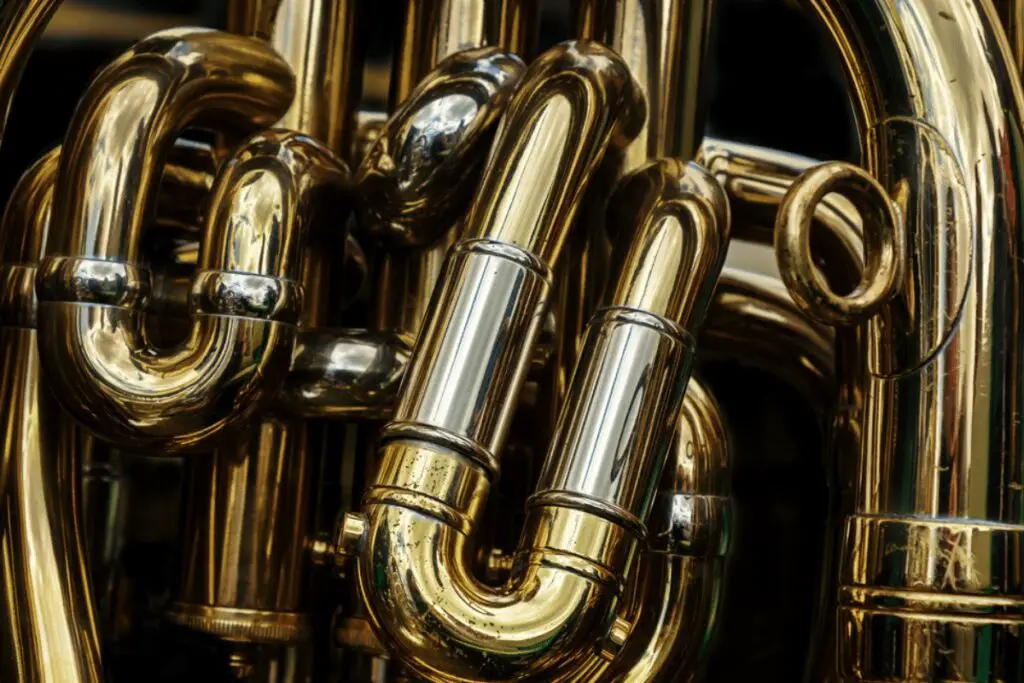One of my favorite things to help people with is when they are searching for new tubas!
It’s a big step and a large investment in buying your first tuba and own instrument, so you want to make sure you make all the right choices.
Well, I’m here to help with this guide to buying a tuba.
Look ahead for information on when you should buy, what you need to look for, and how to pick the right one for your needs.
Hey! If you like tuba stuff, check out my Instagram!
Table of Contents
When Should I Buy A New Tuba?
The first step to getting a tuba is deciding whether you or your student needs one.
In some cases, you may not.
Here’s my general advice:
You’re ready to buy a tuba when you’re an adult who loves to play one or a high schooler serious about playing the tuba after high school.
Before this point, it’s a big investment to make, and schools will provide tubas for you in most cases.
Adults who play the tuba or want to play in community bands for sure should look for one of their own.
This is where our guide will help you find one that works for you (and save you some money, too!).
Middle schoolers don’t need their own tubas at all.
Schools should provide a tuba for a young player.
They may not be great, but they don’t need to be for the first couple of years.
In high school, if you or your student is taking lessons and wants to play tuba in college, it may be time to start looking or thinking about a horn.
Which should you get?
We’ll talk about this in the next section.
If you don’t get a tuba in high school at all and you want to play in college, it’s not the end of the world.
Most universities will let you borrow one.
My wife got her tuba in high school.
I got mine in college and borrowed one when I first got there.
(Yes, we’re both tuba players and met in college. Yes, it’s kind of adorable.)
There are options.
If you end up as an adult with no tuba and no college and you want to play in a community group, talk to the local band directors.
There’s a chance they could let you borrow one or sign it out for a nominal fee.
BBb Vs. CC Tuba?
This is the big question for a lot of people when looking at buying a horn.
There are two main types of tubas to consider if you buy in high school or if you buy in college:
BBb and CC tubas.
Both tubas are perfect in most cases, but there are some general rules in the professional tuba field around these two.
First, let’s talk about what these are.
Both are contrabass tubas, meaning they play two octaves or more below middle C.
A BBb tuba (often also called a Bb tuba) plays with the open tuba (no valves pressed down) with a fundamental pitch of Bb1.
BBb tubas are the most commonly used tubas in concert bands at the high school, middle school, and community band levels.
They’re also used a lot in brass bands.
If you’re an adult who wants to play in a community band or a good high schooler with no professional aspirations, a BBb tuba is right for you.
CC tubas have a fundamental pitch of C2 (two octaves below middle C).
This means that when you play with no valves pressed down, you play a C, not a Bb.
C tubas are mainly played by professionals and those who received collegiate-level training.
It can be used in any ensemble, and its key helps the fingerings work better in sharp and flat keys.
If you want to study tuba beyond high school or perform tuba at a higher level, then consider getting a CC tuba.
Eb Tuba Vs. F Tuba?
If you’re doing research, you’ll likely come across an Eb and F type of tuba.
How do these fit into our tuba-buying journey?
If you’re reading this article, it’s probably not the right time for you.
Eb and F tubas are bass tubas, and they fit between the typical contrabass tuba and the euphonium or baritone.
Because they play higher, these are more solo tubas and have a more niche use.
Eb tubas are a solo tuba used more often in Europe and in brass bands.
F tubas are a common solo tuba, sometimes used in brass bands and also seen in a brass quintet or other small ensembles.
If you’re at that point where you want one, you should talk to your lesson teacher for advice.
Barring that, you’ll find more details and advice in our article on the best F tubas.
Click for more specific recommendations.
Tuba Size
Tuba size beyond the key and the pitch is a big element to consider.
Tubas are often labeled by quarter sizes:
- 3/4
- 4/4
- 5/4
- 6/4
These sizes aren’t standard, but they do refer to the bore size.
3/4 tubas are small tubas.
If you’re buying your own tuba, don’t get one of these.
It’s a little bit easier to get a sound of it at first, but you’re extremely limited in your ability to produce a rich, deep tone.
Most tubas are the 4/4 or full-size variety.
With this bore, you get a good mix of playability, potential power, and great sound quality.
The next size up is 5/4, and it’s the most common of the professional tubas and advanced players.
Both my wife and I have 5/4 tubas.
With a larger bore, you have to work harder to fill up the tuba, but the sound you get is richer and more powerful.
An even larger size than this is the monstrous 6/4 tuba.
6/4 tubas are quite expensive and massive.
Most people need a special stand to hold them up while they play.
Some professionals play on this, and the sound they produce is insane.
But, it takes a lot of you and requires a high skill level.
A friend of mine has one, and I’ve played on it.
It sounds amazing, but it requires a ton of work.
10 years later, since he got it, he’s trading it in for a 5/4.
It’s just too much for most people, and it doesn’t need to be that big.
Still, it’s definitely a good tuba and a conversation starter.
One important to note is that the size doesn’t actually correlate to any specific measurement.
In general, a 4/4 is normal-sized, but this may look different from brand to brand.
It’s even possible to have a 4/4 tuba be bigger than another brand’s 5/4 tuba.
Keep this in mind when you shop.
Tuba Material Comparison

Tubas are all made out of brass (usually), but this doesn’t mean they are all exactly the same.
For materials, there are three main variations:
- Gold brass
- Yellow brass
- Rose brass
These do come with slightly different looks, but it’s more than just style or aesthetic choice.
Each material has a direct effect on the tone your tuba produces.
Gold brass is one of the more common ones on professional horns.
It makes a darker sound than the yellow brass tubas.
Yellow brass is generally cheaper and more bright in tone.
Rose brass tubas have a very warm sound, like a giant brass instrument hug.
Still, many prefer the gold brass because they feel it walks that middle ground of power with a depth of tone.
Don’t confuse material with the “color” of the tuba.
Any of these can be any color; it depends on the finish.
We’ll talk about finish types in a later section.
Number Of Valves
The number of valves is another one of the key elements you need to consider when buying a tuba.
The big debate a lot of people get into when they first look for tubas is whether 4 valves are truly needed.
Yes, if you’re buying a tuba, you need to get one with 4 valves.
Having that fourth valve gives you access to better in-tune playing and lower notes.
Get more details in our article on 3 valve vs. 4 valve tubas.
Under no circumstances should you get a 3-valve tuba.
These are student tubas and don’t sound good.
These are really only for middle school players because they’re cheap.
But even then, I think a band director should start their kids on a four-valve tuba right away.
There are 5 and 6 valve tubas out there too.
If you are serious about playing the tuba at a higher level, then 5 valves will do the trick.
Professional models have 5 valves or more.
6 valves provide even more alternate fingering options, but to be honest, they aren’t that useful.
5 valves are more than enough for any tuba player.
Style Of Tuba Valves: Rotary Vs. Piston
There are two main types of valves you’ll see on tubas:
- Rotary valves
- Piston valves
Both types work great, but if you’re buying your own tuba, you’ll need to make an intentional choice about which you want.
Piston valves are the more common type on the average tuba.
They work super fast and are usually much quieter.
But, they require a lot more work to keep up.
You’ll need to oil them regularly, or they’ll get stuck.
Also, if you press on them with any sort of angle other than straight up and down, they may get slightly bent and sticky.
A rotary valve tuba is seen more on higher-end tubas.
They work very consistently without any upkeep.
My wife and I both have rotary valves on our tubas, and we never have to do anything to them, even if we don’t play them for a while.
However, I can tell when switching between rotary and piston that the rotary valves are a little slower.
And they definitely make a clunky sound when pressed at times.
This isn’t usually noticeable unless you’re playing in small groups.
I would say most people will do better with rotary valves, but they cost more than pistons do.
Keep this in mind when looking for your tuba.
Finish Types: Is One Better Than The Other?
Tubas are finished in either a lacquer (protective metal paint) or a plating, often silver.
Lacquer is cheaper, durable, and doesn’t impact the sound at all.
The lacquer can affect the color and style, but it doesn’t impact the tone quality.
It’s purely a matter of preference.
Many professional horns use lacquer, so it’s not like it’s a less-quality option.
It really doesn’t make much of a difference.
The other option is silver-plating.
A lot of tuba players say the silver plating makes a warmer sound.
I’d agree with this, but I’ll add that a good player can get just as much warmth out of lacquer without adding more to the price range or having to keep it up.
Silver plating needs to be polished and protected, and it costs more.
Best Tuba Brands

Going with a trusted brand for your tuba is always a good idea.
Some manufacturers are just better than others.
Here’s a quick rundown of the ones I trust more than others:
- Miraphone
- Jupiter
- Yamaha (a little risky on the low end, but great on the middle and high-end tubas)
- Meinl Weston
- Hirsbrunner
- Besson
Of course, there are other good options, but these are the ones I’d check out first.
Should I Buy A New Or Used Instrument Like The Tuba?
Whether you’re buying for a professional tuba or as a tuba enthusiast, buying new or used is completely up to you.
Buying new gets you a quality horn with no big problems.
You also get some level of guarantee if it doesn’t work out.
Buying used saves you a ton of money, and if you do it right, you’ll end up with an equal quality of tuba regardless.
The issue with buying used is that you don’t know if it was damaged heavily before, and you don’t always get a guarantee or return if it doesn’t work out.
Many are still in good condition, though.
It’s largely up to you and depends completely on your situation.
Tips For Getting A Good Used Tuba
If you decide to go the used route, here are a few tips that’ll help you feel more comfortable with your purchase:
- Research the model and its reviews
- Ask if it had been damaged severely in the past
- Play on it before you buy, testing all of its range and intonation
- Study the valves for bent stems, especially if they’re piston valves
- Minor dents happen, but damage to slides and valves is a bigger issue
- Take along a skilled tuba player to help you assess it
- Ask if you can try it out for a week if you put down a deposit; many are OK with this
Where Should I Go To Buy A Tuba?
There are a few places to look for tubas, each with its own pros and cons.
I suggest checking them all out to a certain degree.
Local Music Store
Your local music store is a convenient place to find tubas.
They’ll often have a mix of used and new for you to check out.
And you can check them out multiple times if you want.
They’ll also organize renting in many cases.
But, most music stores cater to many a musical instrument, so their tuba options are somewhat limited.
They also rarely keep the more professional level horns in stock.
Big Stores Like Woodwind Brasswind
Larger music dealers and stores like Woodwind Brasswind keep all sorts of professional tubas in stock and ready to try out.
I’ve been there a few times myself, and they even have special rooms to play the horns in that simulate the feel of concert halls!
But, you have to travel a way to get to one of these places.
They also mainly keep new instruments in stock.
A new tuba is an expensive instrument.
Still, if you’re serious about getting one, it might be the best option for you.
Buying Online
A lot of folks knock buying online, but most of the online places also have a return policy.
So while you can’t try out a ton of tubas in one go, you can always ship them back and try another one.
I like working with Woodwind Brasswind, Sweetwater, and Thomann for my tuba needs.
Reaching Out To Nearby Universities
Universities often have some sort of music program, and they’ll have tubas (usually really good ones, too).
If you want to buy one, ask if they’re thinking about upgrading their tubas.
They usually do this every few years, so you’ll be able to buy their used ones for less than they would cost new.
And they’re often well-cared-for.
On top of this, music students may be looking to offload a tuba they bought and upgrade, so you may be able to buy a used one for a much lower price (this happened to my wife and me as the people we bought from upgraded their horns).
Facebook Marketplace
Don’t knock it until you’ve tried it, but online marketplace do sell tubas locally at times.
You have to be more careful with these, and you’ll never find a professional horn there.
But if you just want a good tuba to play on, you may end up with one heck of a deal.
Examples Of Great Tubas For Most Situations
In this section, I’ll offer some good options for tubas for several common situations.
Naturally, these aren’t the only ones out there, but if you’re having trouble getting started, this will give you someplace to start.
Disclosure: Some links may be affiliate in nature, which means I earn a small commission if you click and buy. Thank you for supporting our content!
The Average Adult Wanting To Play The Tuba
Yamaha 321 BBb Tuba
This tuba features a 4/4 size and four piston valves.
It’s big enough to sound great but not so big or fancy that it breaks the bank.
This is one of the most affordable tubas that still sound pretty good, and it’s perfect for anyone who just enjoys playing the tuba.
The High Schooler Who Wants To Keep Playing For Fun
Miraphone Hagen 496
This BBb tuba is for the high schooler who wants to capitalize on their experience and keep playing for fun.
It won’t hold up on the professional circuit, but it’ll still blow most other tubas out of the water.
Its 5/4 size isn’t for the faint of heart, and the 4 rotary valves will work without much maintenance required.
Dominate your ensembles and make an investment that’ll stick with you for the rest of your life.
The Person Who Wants To Study Tuba Playing
Miraphone CC-291B
If you want to study tuba, you need a CC tuba, and you need 5 valves.
The Miraphone 291B fits the bill perfectly.
Its 5/4 size, 5 rotary valves, and great design are just what you need to play on a more professional level.
The Tuba Solo Artist
Yamaha 822F Tuba
This tuba is an F tuba, so it plays higher, but it doesn’t sound small.
It’s a full-sized horn with 4 quick action valves for faster solo playing.
This instrument is perfect for any tuba player wanting to take on more of a solo role or play in small ensembles.
Should I Get A Sousaphone (Marching Tuba)?
No, a sousaphone is not a valid choice for anyone who wants to play the tuba in a concert band, community band, wind bands, or any small ensemble.
The only reason you’d want to buy your own sousaphone is if you’re playing in a street performing band.
Otherwise, its only real use is in marching bands or mariachi bands.

